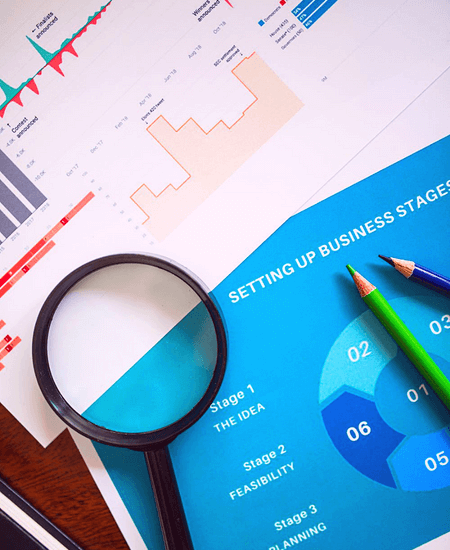A feasibility business plan is prepared to assess the viability and profitability of a proposed business venture with calculations, analysis, and estimated projections before going ahead with it.
The feasibility business plan answers key questions about the product or service, target demographics, and required capital. A feasibility business plan provides recommendations for moving forward and primarily answers two questions. Whether anyone will buy the product or service and if the venture can profit.
RELATED SERVICES: Strategic Business Plan, Investor Business Plan
Traits of a Good Feasibility Business Plan
Thoroughness: A good feasibility business plan demonstrates deep understanding of the business concept, target market, competition, financial aspects, and potential barriers. It should address all relevant factors thoroughly, providing a clear and complete evaluation of the proposed business’s feasibility.
Realistic and Objective: The feasibility business plan’s foundation should be based on realistic assumptions and objective analysis, relying on sound research and data. It should avoid overly optimistic projections or unrealistic expectations. By objectively assessing potential risks and challenges, the plan will present a balanced view of the business’s viability.
Market Understanding: A sound feasibility business plan demonstrates a comprehensive understanding of the target market, encompassing its size, trends, customer needs, and competitive landscape. It identifies a distinct market niche and emphasizes the unique value proposition offered by the proposed business.
Financial Viability: The feasibility business plan shall provide realistic financial projections, including income statements, balance sheets, and cash flow statements. It shall exhibit cost estimates, revenue sources, pricing strategy, and anticipated profitability, along with key financial ratios/indicators.
Feasibility Analysis: The plan should present a detailed analysis of the business idea’s feasibility, considering factors such as market demand, customer needs, competition, resource requirements, regulatory considerations, and potential risks. It shall substantiate that the business concept is viable and possesses a high likelihood of success.
Actionable Strategies: A strong feasibility business plan shall outline actionable strategies for marketing, operations, and management. It should specify the necessary steps to launch and grow the business, including marketing tactics, distribution channels, staffing needs, and key milestones.
Our Methodology
We can take the business planning work off your plate, so that you shall focus on other things that matter the most for your company. Our methodology to prepare The Feasibility Business Plan is outlined below:

1. Discover
Beginning with a discussion about your business idea, we then create a Feasibility Business Plan. This plan outlines the steps, project scope, goals, and timeline. Additionally, we’ll send you a survey to collect basic info about your idea or company. Following this, we’ll have another interactive Q&A session to fully understand your business and project needs.

2. Preparation
Building on the insights from earlier, we’ll start developing the Feasibility Business Plan. Projections will be finished and sent to you for review in the first week. Next, an initial plan draft will come in the second week. By the third week, a full business plan draft will be ready for your review, all while we continue to develop the plan.

3. Completion
We expect you to review the full Feasibility Business Plan and provide valuable feedback. We’ll then make any needed changes to the plan, and the final version will be sent to you for your use.

4. Retain Us
Retain our services to keep your business plan up-to-date in the long-run. We will be responsible for updating the business plan as circumstances and variables change in the future. We will ensure you always have access to the up-to-date business plan to productively engage with any investors at any time.
Our Value Proposition
100%
WINNING BUSINESS PLANS
Our business plans are proven to generate results, whether it would be raising capital or steering the company’s operations to success. Our methodology also ensures your productive participation in developing the plan so that we can tailor it to exceed your expectations.
3w
AVERAGE PROCESSING TIME
Our average processing time is 3 weeks (15 working days). We can always expedite the business plan preparation to complete it quicker than 3 weeks. The fastest turnaround time we can achieve is 7 working days. The expedition is subject to our team’s availability and other terms and conditions.
2x
VALUE FOR MONEY
With our business plan services, you get two times more value for your money because of affordable pricing and amazing results.
How to Write a Feasibility Business Plan?
The development of a business plan for every company requires a unique approach, making the plan content vary case by case. However, the following template shall help in understanding our approach to develop a feasibility business plan.
Remember to revise and proofread your feasibility business plan to ensure clarity, coherence, and accuracy. It’s also beneficial to seek feedback from trusted advisors or mentors to enhance the quality of your plan. With years of experience, our team can help you either create a new feasibility business plan or review and update an existing one.

